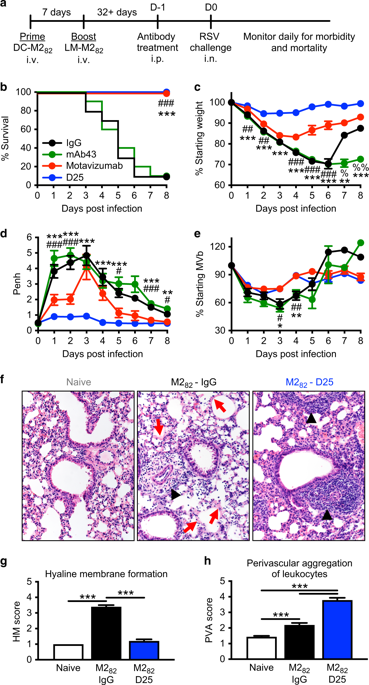当前位置:
X-MOL 学术
›
Mucosal Immunol.
›
论文详情
Our official English website, www.x-mol.net, welcomes your
feedback! (Note: you will need to create a separate account there.)
Pre-existing neutralizing antibodies prevent CD8 T cell-mediated immunopathology following respiratory syncytial virus infection.
Mucosal Immunology ( IF 7.9 ) Pub Date : 2019-12-16 , DOI: 10.1038/s41385-019-0243-4 Megan E Schmidt 1 , David K Meyerholz 2 , Steven M Varga 1, 2, 3
Mucosal Immunology ( IF 7.9 ) Pub Date : 2019-12-16 , DOI: 10.1038/s41385-019-0243-4 Megan E Schmidt 1 , David K Meyerholz 2 , Steven M Varga 1, 2, 3
Affiliation

|
Despite being a leading cause of severe respiratory disease, there remains no licensed respiratory syncytial virus (RSV) vaccine. Neutralizing antibodies reduce the severity of RSV-associated disease, but are not sufficient for preventing reinfection. In contrast, the role of memory CD8 T cells in protecting against a secondary RSV infection is less established. We recently demonstrated that high-magnitude memory CD8 T cells efficiently reduced lung viral titers following RSV infection, but induced fatal immunopathology that was mediated by IFN-γ. To evaluate the ability of RSV-specific neutralizing antibodies to prevent memory CD8 T cell-mediated immunopathology, mice with high-magnitude memory CD8 T cell responses were treated with neutralizing antibodies prior to RSV challenge. Neutralizing antibody treatment significantly reduced morbidity and prevented mortality following RSV challenge compared with IgG-treated controls. Neutralizing antibody treatment restricted early virus replication, which caused a substantial reduction in memory CD8 T cell activation and IFN-γ production, directly resulting in survival. In contrast, therapeutic neutralizing antibody administration did not impact morbidity, mortality, or IFN-γ levels, despite significantly reducing lung viral titers. Therefore, only pre-existing neutralizing antibodies prevent memory CD8 T cell-mediated immunopathology following RSV infection. Overall, our results have important implications for the development of future RSV vaccines.
中文翻译:

预先存在的中和抗体可防止呼吸道合胞病毒感染后 CD8 T 细胞介导的免疫病理学。
尽管呼吸道合胞病毒 (RSV) 疫苗是导致严重呼吸道疾病的主要原因,但目前尚无获得许可的疫苗。中和抗体可减轻 RSV 相关疾病的严重程度,但不足以预防再感染。相比之下,记忆 CD8 T 细胞在防止继发 RSV 感染方面的作用尚不明确。我们最近证明,高强度记忆 CD8 T 细胞可有效降低 RSV 感染后的肺部病毒滴度,但会诱导由 IFN-γ 介导的致命免疫病理学。为了评估 RSV 特异性中和抗体预防记忆 CD8 T 细胞介导的免疫病理学的能力,在 RSV 攻击之前用中和抗体处理具有高强度记忆 CD8 T 细胞反应的小鼠。与 IgG 处理的对照组相比,中和抗体治疗显着降低了 RSV 攻击后的发病率并预防了死亡率。中和抗体治疗限制了早期病毒复制,导致记忆CD8 T细胞活化和IFN-γ产生大幅减少,直接导致存活。相比之下,尽管显着降低了肺部病毒滴度,但治疗性中和抗体的施用并没有影响发病率、死亡率或 IFN-γ 水平。因此,只有预先存在的中和抗体才能预防 RSV 感染后记忆 CD8 T 细胞介导的免疫病理学。总体而言,我们的结果对未来 RSV 疫苗的开发具有重要意义。
更新日期:2019-12-16
中文翻译:

预先存在的中和抗体可防止呼吸道合胞病毒感染后 CD8 T 细胞介导的免疫病理学。
尽管呼吸道合胞病毒 (RSV) 疫苗是导致严重呼吸道疾病的主要原因,但目前尚无获得许可的疫苗。中和抗体可减轻 RSV 相关疾病的严重程度,但不足以预防再感染。相比之下,记忆 CD8 T 细胞在防止继发 RSV 感染方面的作用尚不明确。我们最近证明,高强度记忆 CD8 T 细胞可有效降低 RSV 感染后的肺部病毒滴度,但会诱导由 IFN-γ 介导的致命免疫病理学。为了评估 RSV 特异性中和抗体预防记忆 CD8 T 细胞介导的免疫病理学的能力,在 RSV 攻击之前用中和抗体处理具有高强度记忆 CD8 T 细胞反应的小鼠。与 IgG 处理的对照组相比,中和抗体治疗显着降低了 RSV 攻击后的发病率并预防了死亡率。中和抗体治疗限制了早期病毒复制,导致记忆CD8 T细胞活化和IFN-γ产生大幅减少,直接导致存活。相比之下,尽管显着降低了肺部病毒滴度,但治疗性中和抗体的施用并没有影响发病率、死亡率或 IFN-γ 水平。因此,只有预先存在的中和抗体才能预防 RSV 感染后记忆 CD8 T 细胞介导的免疫病理学。总体而言,我们的结果对未来 RSV 疫苗的开发具有重要意义。











































 京公网安备 11010802027423号
京公网安备 11010802027423号